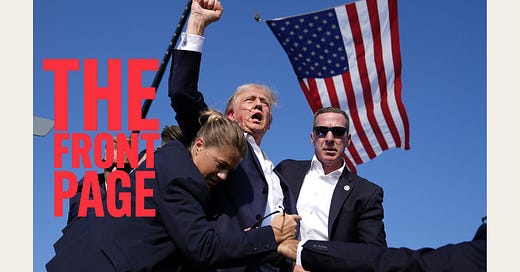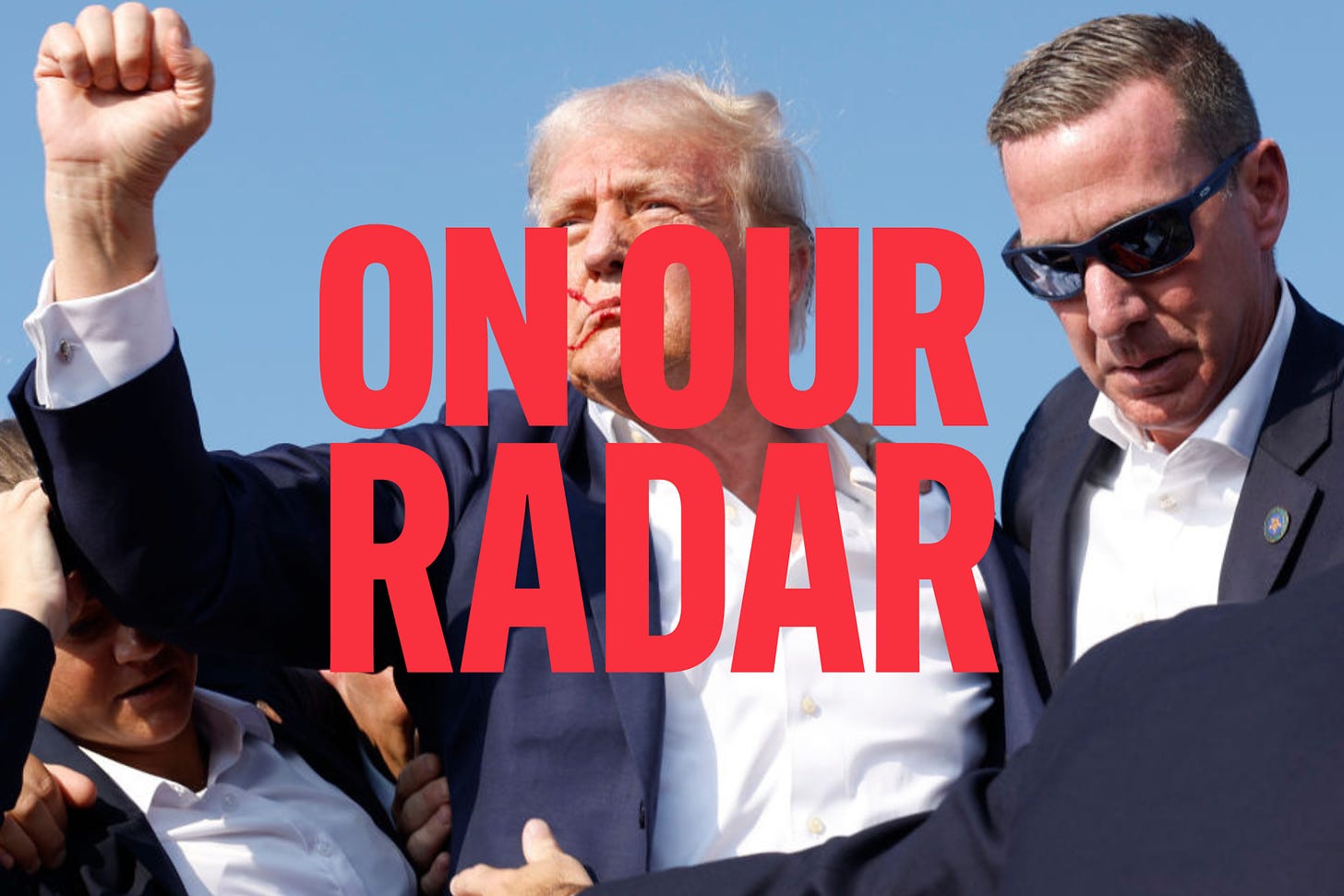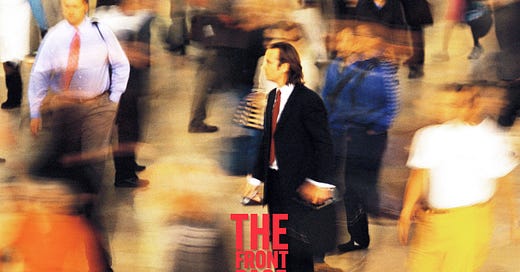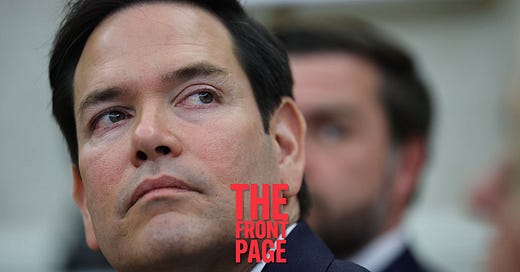
The Free Press

In the hours since a would-be assassin almost killed Donald Trump, we’ve been working hard to help you make sense of a dark moment in American history. If you missed any of our coverage so far, catch up by reading this harrowing dispatch from Salena Zito, who was four feet from Trump when he was shot at the rally on Saturday; this essay from Niall Ferguson on what might have happened next if the shooter had slightly better aim; and this morale-boosting column from Douglas Murray on how to respond to an assassination attempt, featuring Teddy Roosevelt and Ronald Reagan.
On today’s Front Page, we bring you more of the fallout from Saturday’s attack, including Eli Lake on the parallels with 1968, Olivia Reingold on the young Trump supporters galvanized by this moment, Marine turned writer Elliot Ackerman on Trump’s transformation into a “combat leader,” Andy Mills on the questions he’d ask Biden in tonight’s primetime interview, and much more.
But first, our lead story: David Masci, the editor-in-chief of Discourse, asks what we might do to pull our nation back from the brink.
In the hours following Saturday’s incident, both sides acted appropriately. Biden strongly condemned the shooting, calling it “sick” and saying that “there’s no place for this kind of violence in America.” He also called Trump and said that he was praying for him and his family. Good.
For his part, Trump released a statement thanking the Secret Service and law enforcement officials for saving his life and expressing condolences for an innocent bystander at the rally who had been killed and concern for another attendee who was injured. Also good.
Call me cynical, but I’m under no illusions that this episode will change either campaign’s willingness to say anything to win. And, needless to say, fellow travelers and cranks on either side will quickly blame the other side for the assassination attempt. But I do hold out a small (frankly, tiny) hope that Saturday’s shooting will remove the incentive for the campaigns to continue behaving irresponsibly.
All of us (including your humble correspondent) frequently shake our heads and tut-tut the sad state of politics in America today. But as with the state of the culture, our politics is a mirror of our society. To put it another way: we have seen the enemy, and it is us. Keep reading for more from David on how to turn down the temperature.
After Saturday’s assassination attempt in Butler, Pennsylvania, young men are coming out of the woodwork to back the former president. Almost immediately in the wake of the news, some of Gen Z’s biggest male icons, including wrestler Jake Paul, YouTuber FaZe Banks, and Barstool Sports founder Dave Portnoy, rushed online to praise the former president’s “gangster” response to the shooting, which killed one rally attendee and critically injured two others. With blood on his face after a bullet clipped his right ear, Trump raised his fist to the crowd and appeared to shout, “Fight!”
In less than 24 hours, that image became an internet meme—from Trump’s face superimposed onto an iconic Matrix scene to a split screen comparing Trump’s stone-cold reaction to Biden tripping over a flight of stairs.
Jordan Miller, 22, was at an airport bar sipping a margarita when the TV flashed that gunfire had broken out at the rally.
“The guy next to me just goes, ‘holy bleep,’ ” says Miller, an operations analyst in Phoenix. “They didn’t even have all the details, like if he got shot, and in the first clip I see, it’s him getting pushed to the ground and then standing back up. It was really cool when he threw his fist up.”
He adds: “It certainly fired me up.”
Previously, he had been planning to vote for RFK Jr., given his promise to crack down on Big Pharma, but in that moment, he tells me he realized voting for Trump could do a “greater good.”
“It made me feel like I can trust him, and he’s going to stand up for this country,” Miller says of Trump. “I don’t think there’s very many people in this country that after they get shot, one inch from their brain, would be able to get up and essentially tell the country to fight—and I think that’s what he was mouthing while he had his fist up. And I was like, ‘Okay, I’m ready to fight for what I believe in. For what’s right.’ ” Read on for more on the young voters who are turning right.
Listen to Salena Zito talk about the chaos and tragedy she witnessed in Butler, Pennsylvania, in this interview with Michael Moynihan on the latest episode of Honestly:
In an Oval Office address Sunday night, Joe Biden said the nation needs to “lower the temperature in our politics.” (Is the president a Free Press reader?) Easy: saying we should lower the temperature. Harder: actually taking steps to lower the temperature. (The Wall Street Journal)
Corey Comperatore, a former fire chief, was killed trying to protect his family at the Trump rally. Pennsylvania governor Josh Shapiro ordered the state’s flags be flown at half-mast to honor Comperatore. “Corey was a girl-dad. Corey was a firefighter. Corey went to church every Sunday,” said Shapiro, who added, “Corey was an avid supporter of the former president.” (Pittsburgh Post-Gazette)
After her dispatch for The Free Press on the attempt on Donald Trump’s life, Salena Zito snagged the first interview with the former president, who told her he is completely rewriting his convention speech. “This is a chance to bring the whole country, even the whole world, together. The speech will be a lot different, a lot different than it would’ve been two days ago,” he said. (Washington Examiner)
On Saturday evening, BBC correspondent Gary O’Donoghue spoke to a man who saw Trump’s would-be assassin on the roof with a rifle and tried to get the police to help him. An astonishing interview. (BBC)
Melania Trump said in a statement that when she saw “that violent bullet strike my husband, Donald, I realized my life, and Barron’s life, were on the brink of devastating change.” She called on Americans to “ascend above the hate.” (X)
One sign of post-shooting Republican unity: after saying she hadn’t been invited to the RNC, Nikki Haley will now be in attendance and will make a speech. (Fox News)
How will the assassination attempt impact the presidential race? Trump “just won the election,” predicted one House Republican immediately after the shooting. For election model expert Nate Silver, things are a little more complicated. He thinks the attack probably strengthens Trump, but he adds that it is also a highly uncertain moment in a race Trump was already winning—and so is not without its downside risks. (Silver Bulletin)
The failure to protect Trump on Saturday is the latest blunder in a long track record of Secret Service failures and misconduct. A look down the list of the agency’s recent mistakes is a reminder that reality is a far cry from the crack squad of near superhumans it is portrayed as in the movies. (National Review)
The image of Donald Trump, fist in the air, blood streaming down his face, taken by Associated Press photographer Evan Vucci, has become instantly legendary. “I do not think it is an exaggeration to say that the photo is nearly perfect, one that was captured under extreme duress and that distills the essence of a man in all his contradictions,” writes Tyler Austin Harper. (The Atlantic) For more on the significance of Donald Trump’s raised fist, scroll down and read Elliot Ackerman.
Want to beat Trump? Andrew Sullivan advises Democrats to search for their version of Keir Starmer. The Brits’ biggest problem with Starmer is that he’s boring, but boring doesn’t look so bad right now. (The Weekly Dish)
Honestly listeners will remember Eli Lake’s recent special episode on the parallels between the tumult of 1968 and our present political chaos. While these echoes have grown harder to ignore in recent months, anyone who remembers the horrors of ’68 would have thought that things were much worse then than they are today. Until Saturday. Now, 2024 has taken a bloodier hue, with the attempt on Donald Trump’s life eerily similar to the assassinations of Martin Luther King Jr. and Bobby Kennedy.
Those killings ushered in an era of chaos.
“The question that remains,” Eli writes today, “is whether the near calamity of this weekend will doom America to another era of chaos. Put another way, if Trump wins a second term in November, will the already enraged fringe of the American left go quiet? Or will they seek the bullet over the ballot as they did more than half a century ago?”
Read Eli’s latest: “It’s 1968 All Over Again.”
→ A former Marine says Trump just became a combat leader: When I led raids as a Marine Corps special operations leader in Iraq and Afghanistan, I used to move around the objective with my hands in my pockets. I did this to show the Marines that I wasn’t afraid—even if I was. Acting calm in a firefight wasn’t always easy, but it’s what a combat leader does. Whatever you think of Trump, he proved himself to be a combat leader on Saturday. A bullet came an inch from blowing his brains out. He took cover. And when he stood, with blood splattered across the side of his face, he had the presence of mind to pump his fist in the air and shout, “Fight!” and “USA!” to his supporters, just when they were looking to him for leadership.
The attack fundamentally reshapes the presidential race. Trump’s detractors understand this intuitively. It’s why outlets like MSNBC immediately picked up on a rumor that Trump’s wound came from glass from his teleprompter, not a bullet. A brush with a teleprompter doesn’t possess the same valence as a brush with a bullet—these stories vanished once The New York Times published an extraordinary photograph of the bullet whizzing by Trump’s head.
When a bullet whizzes by your head, a binary choice is immediately presented to you: fight or flight. Trump chose the former. A pair of photos have emerged from yesterday. The first is a close-up of Trump, on the ground, appearing stunned, a trickle of blood coursing down his face. The second is taken a moment later. Trump is standing, his fist defiantly in the air.
The way I “fought” was to stay cool, to show my Marines that no matter how hot a firefight became that we were in control. Trump’s style is a bit more on the nose. The way he “fights” is by literally raising his fist and shouting the word to a crowd. But every part of his response was deliberate. It’s why he was insisting on keeping his shoes on. He wasn’t going to be led from the stage in front of millions of Americans in his stocking feet.
The assassination attempt has also given Trump a new moral authority. What he does with it matters a great deal, both for his election chances and the country. The true leader, the one worth voting for, will figure out how to bring the country together in this crisis, even amid an ongoing election. —Elliot Ackerman
→ The partisan trap: An hour and a half after Donald Trump was nearly killed at a rural Pennsylvania campaign rally, Dmitri Mehlhorn, a Democratic strategist in northern Virginia who advises Democratic mega-donor Reid Hoffman, emailed journalists, suggesting the shooting might have been “staged.”
Mehlhorn acknowledged that the idea of a fake almost-assassination “feels horrific and alien and absurd in America, but is quite common globally.”
This way, Mehlhorn said, “Trump could get the photos and benefit from the backlash.” Vladimir Putin and Hamas terrorists have employed similar tactics, he added.
“If any Trump officials encouraged or knew of this attack, that is morally horrific, and Republicans of decency must demand that Trump step down as unfit.”
By this late date, there’s nothing especially surprising about a partisan, on either side, floating nutty conspiracy theories. Recall that two years ago, Republican influencers like Donald Trump Jr. and Dinesh D’Souza pushed the totally uncorroborated theory that the intruder who attacked Paul Pelosi, husband of then-Speaker Nancy Pelosi, was his gay lover.
We have come to expect those engaged in electoral battles to say and tweet and post the most absurd, offensive blather. Their job is not to seek out the truth, but to fight relentlessly—blindly.
The problem, of course, is that they forget that the rest of us—the vast majority of us—are not partisans, that we are capable of something more generous and ecumenical. That we are able to disagree passionately with our fellow Americans about the border or the climate or TikTok or whatever and still, somehow, not fall for the most insidious lies about them. That we can make basic moral distinctions. For example, Trump is not Vladimir Putin. Nor is he Adolf Hitler. He’s just the presumptive Republican nominee.
He’s also, as one Democratic consultant put it to me, “the luckiest son of a bitch who ever lived. The fact that he emerged from this thing with the presence of mind to do that fist pump in the air and the whole Rambo thing is just unbelievable.”
There are, to be sure, millions of Americans who fear that President Trump, given a second term, won’t defend and uphold the Constitution. That he endangers our democracy. There are also millions of Americans who believe that President Biden has been a disaster—and that he’s the one endangering democracy with his lies about his mental acuity.
So be it. But we need not succumb to the partisan trap. The partisan stupidity. Because that is exactly what this is. A myopia and mindlessness so blinding that it conjures up scenarios that go beyond the fiercest partisanship into the realm of insanity. That’s what happens when one views one’s political foe not as a human being with human failings, but as Satan himself. Donald Trump, his innumerable foibles notwithstanding, is not Satan.
On Sunday, Mehlhorn followed up with another email: “Last night, I sent an email I now regret. I drafted and sent it without consulting my team. I have apologized to them directly. I also want to apologize publicly, without reservation, for allowing my words to distract from last night’s central fact: political violence took yet another innocent American life.” He also said he agreed “entirely” with Reid Hoffman’s “thoughtful post” Sunday morning, in which Hoffman said that he was “horrified and saddened by what happened to former President Trump and wish him a speedy recovery.”
When I texted Mehlhorn to see if he had anything else to add, he texted back: “Nope that’s it,” adding a sideways smiley face. —Peter Savodnik
→ Six questions Biden must be asked tonight: This evening, President Biden will sit down for his first interview since the assassination attempt on Donald Trump. It will be his second interview since his disastrous debate performance, but arguably, this interview with NBC’s Lester Holt is maybe the most important of Biden’s presidency—and an opportunity for Holt to make not just news, but history.
As a reporter and producer, I have crafted high-stakes interview questions for journalists, including at The New York Times, where I co-created The Daily podcast; at The Free Press; and for my own show, Reflector. If I were writing questions for Holt, here’s what I’d advise him to ask Biden:
Both you and President Trump have continually attacked one another personally and made sweeping claims about the dangers that will befall our country if you lose this election. You have said repeatedly that Trump is a dangerous man who will use his power to “systematically dismantle and destroy our democracy.” In light of the attempt on President Trump’s life, will you pledge today to tone down your rhetoric? Or do you stand by your words?
You ran in 2020 with a pledge to unite the country, but under your leadership the country has continued to see increasing political polarization. You have repeatedly called some of your opponent’s supporters “MAGA extremists” and said that “MAGA forces are trying to move the country backward” and take away the rights of citizens, including the right to vote. Do you think these claims have helped further divide the country you pledged to unite?
Many members of the Democratic Party regularly liken President Trump to a dictator, saying he poses an existential threat to the country. What would you like to say to members of your party tonight?
In 2022 a man was caught by the FBI attempting to assassinate Justice Brett Kavanaugh. He planned on killing several other conservative members of the Supreme Court. You have spent the last several years repeatedly attacking the judicial branch and their rulings, using increasingly sharp rhetoric and strongly implying the court is a danger to the country. Do you think this contributes to the problem of Americans seeing their fellow countrymen less like political opponents and more like their mortal enemies?
In recent weeks many in the country and several even within your own party have had questions about your mental acuity and ability to do this job for the remainder of your term, let alone for four and a half more years. And yet you’ve refused to take a mental fitness exam. Why not get the exam if you are not worried about what it would reveal?
And, to my mind, the most important question of the night:
You’ve said that your campaign is not about you but democracy. But almost all national polls conducted over the past year show that a vast majority of American people do not want you as the next president. They believe you are no longer fit to do this job. How can you claim to be running to defend democracy while at the same time knowing you are running despite the will of the people? —Andy Mills
No recommendations today. Instead, we’re ending The Front Page with a poem. Joseph Massey (Substack’s best poet—subscribe here) tweeted Walt Whitman’s “I Hear America Singing” the day after the shooting. We second the sentiment.
I Hear America Singing
By Walt Whitman
I hear America singing, the varied carols I hear,
Those of mechanics, each one singing his as it should be blithe and strong,
The carpenter singing his as he measures his plank or beam,
The mason singing his as he makes ready for work, or leaves off work,
The boatman singing what belongs to him in his boat, the deckhand singing on the steamboat deck,
The shoemaker singing as he sits on his bench, the hatter singing as he stands,
The wood-cutter’s song, the ploughboy’s on his way in the morning, or at noon intermission or at sundown,
The delicious singing of the mother, or of the young wife at work, or of the girl sewing or washing,
Each singing what belongs to him or her and to none else,
The day what belongs to the day—at night the party of young fellows, robust, friendly,
Singing with open mouths their strong melodious songs.
Oliver Wiseman is a writer and editor for The Free Press. Follow him on X @ollywiseman.
To support The Free Press, become a paid subscriber today:
And if you’re enjoying The Front Page, consider forwarding it to someone else you think might like it.





















Re: Eli, The 20-year old would-be-assassin was a Republican, not a leftist. Hippies choose slower, more grinding means of outing the tyrants from control.
I’ve been reading this Substack since before it was cool. I might even be the first subscriber. But I think today for the first time I read true journalism here.
Peter Savodnik - Ive been a critic but today I applaud you for your fairness and decency.
The questions for Biden - absolute perfection.
Please please keep this up!